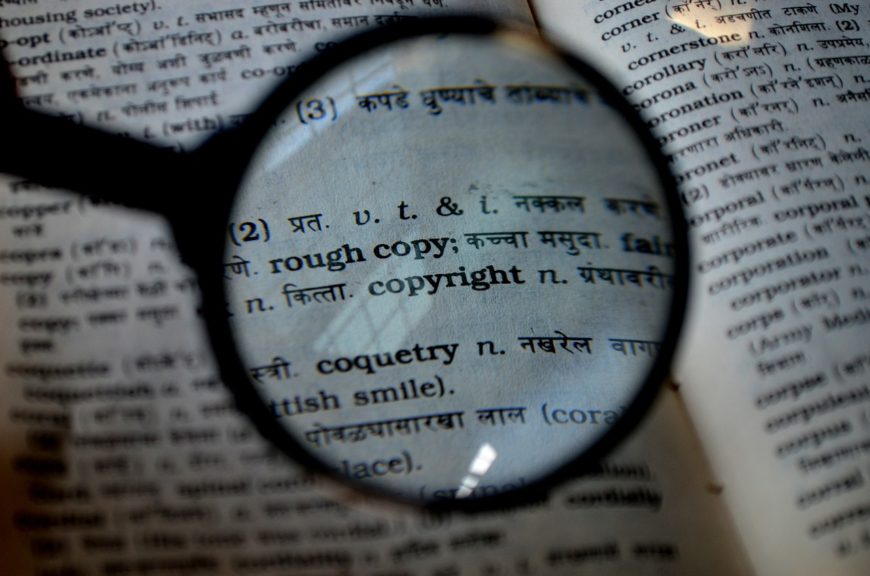What is a Copyright?
Definition of a Copyright
Copyright is a form of protection provided by the laws of the United States to the authors of “original works of authorship”, including literary, dramatic, musical, artistic, and certain other intellectual works. This protection is available to both published and unpublished works. Section 106 of the 1976 Copyright Act generally gives the owner of copyright the exclusive right to do and to authorize others to do the following:
- reproduce the work in copies of phonorecords
- prepare derivative works based upon the work
- distribute copies or phonorecords of the work to the public by sale or other transfer of ownership, or by rental, lease, or lending
- perform the work publicly, in the case of literary, musical, dramatic, and choreographic works, pantomimes, and motion pictures and other audio-visual works
- display the work publicly, in the case of literary, musical, dramatic, and choreographic works, pantomimes, and pictorial, graphic, or sculptural works, including the individual images of a motion picture or other audio visual work
- perform the work publicly (in the case of sound recordings) by means of digital audio transmission
(17 U.S.C. Section 102)
Who can claim Copyright?
“Copyright protection subsists from the time the work is created in fixed form. The copyright in the work of authorship immediately becomes the property of the author who created the work. Only the author or those deriving their rights through the author can rightfully claim copyright.” – 17 U.S.C, Section 201(a)
Term of a Copyright
For works created after 1978, the duration of ownership is for the life of the author(s) plus seventy (70) years after the author’s death.
For works that are anonymous, pseudonymous, or a work made for hire, the period of time is ninety-five years from the date of first publication, or 120 years from the date of creation, whichever is sooner.
Notice of Copyright
The following symbols are used to show copyright:
(c), © , Copr. or Copyright
Examples:
- “Copyright 2017 Albert Justin Lum”
- “Copr. 2017 Albert Justin Lum”
- “© 2017 Albert Justin Lum”
- “Copyright © 2017 Albert Justin Lum”
Why Register your Copyright?
Without copyright registration, damages are limited to actual damages.
With copyright registration, one can obtain statutory damages, up to $30,000 per infringement for innocent infringement (“I didn’t know I was violating copyright laws”) to $150,000 per infringement for willful infringement (“Copyright? Who cares!) as well as attorney fees; and injunctive relief.
What does “Work for Hire” mean?
A “work made for hire” is–
- a work prepared by an employee within the scope of his or her employment; or
- a work specially ordered or commissioned for use…
- as a contribution to a collective work,
- as a part of a motion picture or other audiovisual work,
- as a translation,
- as a supplementary work,
- as a compilation,
- as an instructional text,
- as a test,
- as answer material for a test, or
- as an atlas,
- if the parties expressly agree in a written instrument signed by them that the work shall be considered a work made for hire.
- For the purpose of the foregoing sentence, a supplementary work” is a work prepared for publication as a secondary adjunct to a work by another author for the purpose of introducing, concluding, illustrating, explaining, revising, commenting upon, or assisting in the use of the other work, such as forewords, afterwords, pictorial illustrations, maps, charts, tables, editorial notes, musical arrangements, answer material for tests, bibliographies, appendixes, and indexes, and an “instructional text” is a literary, pictorial, or graphic work prepared for publication and with the purpose of use in systematic instructional activities.
(17 U.S.C, Section 201(b))
Bottom line, if you hire an independent contractor to create something for you, make sure there is an agreement that whatever is created is made as “work for hire” and the owner of the copyright will be you.
Not sure if you should be registering a copyright? Perhaps you’re worried about breaking copyright laws? Read more on how we can help your business with intellectual property!

